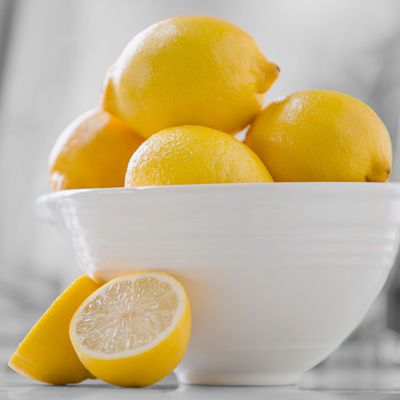
You’ve probably seen more and more alkaline water on store shelves or read about celebrities who swear by alkaline diets. Proponents say that following a low-acid, alkaline diet will change your body’s pH levels and help reduce inflammation, prevent cancer and osteoporosis, and promote general health. It’s one of the arguments for drinking lemon water; to alkalize is essentially to detox. But is your body really an acidic cesspool?
The human body is designed to keep your blood pH between 7.35 and 7.45, which is slightly alkaline (the pH scale goes from 0 to 14, with values up to 7 being acidic and those over 7 being alkaline, or basic). But experts don’t believe that what you consume affects your pH.
“You cannot change your blood pH by the food that you eat. You can change the pH of your urine but not your blood,” says Brooke Alpert, M.S., R.D., a dietitian in New York City. Kelly Pritchett, Ph.D., R.D.N., C.S.S.D., and an assistant professor of nutrition and exercise science at Central Washington University, agrees. Blood pH is so tightly regulated that it’s part of your kidneys’ job to excrete waste that keeps it in check, she says. This means if you alkalinize your diet, you will simply pee out the difference — just like how you pee out excess acid now.
That said, Alpert doesn’t totally hate this way of eating. The alkaline diet is heavy on fruits, veggies, and grains after all, and advises cutting back on red meat and processed foods and added sugar. “There’s a lot of interesting points to this diet that I think are super-healthy. The foods are fruits, nuts, legumes, and vegetables — those are all great things for you, go ahead and eat them,” she says. “But don’t eat them assuming that you’re going to change the pH of your body and therefore think, Oh there’s no chance of me getting cancer. It doesn’t work that way.”
It’s fairly similar to the Mediterranean diet, but alkaline advocates also say to limit meat, dairy, and eggs — none of which are inherently bad for you, and in fact they contain lots of good nutrients. It gets even murkier when you learn that the diet suggests limiting some non-animal products (like chickpeas, walnuts, pomegranates, and black tea) because they’re slightly acidic.
“The foods they tell you not to eat … you’re missing some good stuff, you’re missing some good-quality protein,” Alpert says. In this way, it’s kind of like the Paleo Diet, which shuns peanuts and legumes (like peas, beans, lentils, and soybeans) despite the fact that they are extremely healthy.
Some people might find that they feel like a superhero on an alkaline diet — they have less pain, more energy, fewer GI problems, and may have even lost weight — and that’s great for them, but it may not be the lack of acid at work. It could be a result of cutting back on processed food and dairy in favor of a more plant-based diet, Alpert says.
Pritchett agrees, especially on the weight part. “It may result in weight loss initially because it is lower-calorie than what most people are consuming and encourages avoiding processed foods and sugars while increasing the consumption of fruits and vegetables, in line with what nutrition professionals recommend,” says Pritchett, who’s also a spokesperson for the Academy of Nutrition and Dietetics. In short, eating foods that are good for you is good for you.
She adds that the inflammation and cancer claims are just rumors. “While the approach to neutralizing pH is generally healthy, there is little scientific evidence to support the benefits of pH balance and disease prevention.”
“There’s nothing wrong with this diet,” Alpert says. “If you do this diet and feel great, fabulous. Just don’t have a misconception of what you’re actually doing to your body.




